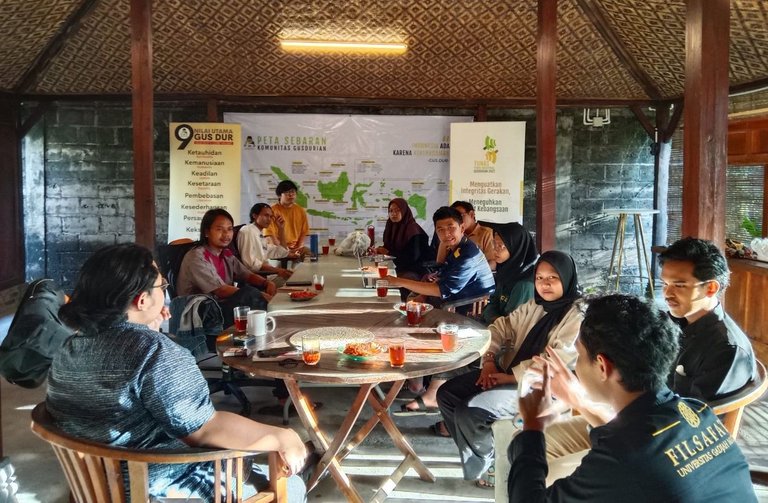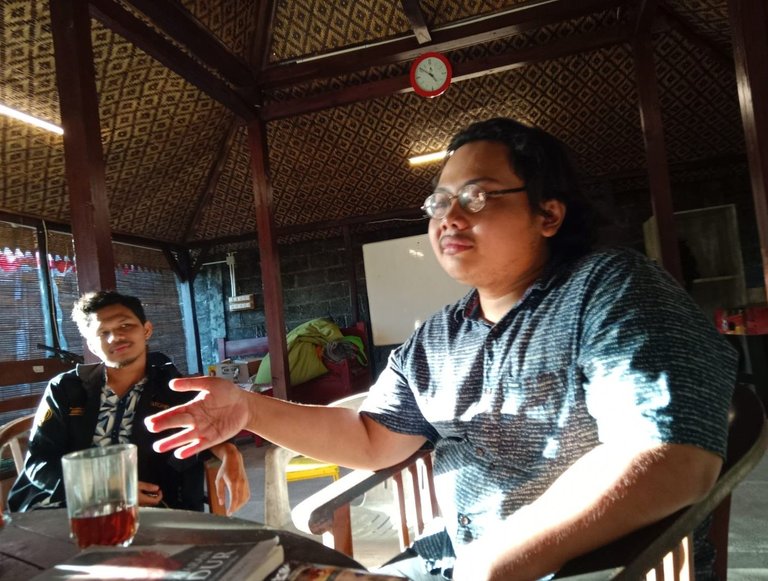As the sun blazed high in the air, Hamasa Hafidzu as a demagogue Gusdurian activator, carried out his duties as common.
Behind setting up tables and chairs, and arranging tea and snacks he was ready to receive the guests. The weather that afternoon was unforgiving. It was indeed scorching; for the past few weeks.
The weather anomalies had been increasingly felt, an unbearable level that seemed to pierce not only the skin but is well one's thoughts.

The clock's hands meticulously indicated the time 3:36 PM - in the Jakarta time zone – the thoroughfare was alive with the ceaseless rhythm of vehicles traversing the roads. Yet, within this energetic scene, an oasis of serenity emerged at Griya Gusdurian.
To get here you need a passage through the intricacies of Sorowajan Street led to its doors. Situated in the neighborhood of Jaranan within the residential complex of RT.08/RW.10, this haven remained shielded from the usual commotion, nestled within the administrative district of Banguntapan, Bantul County, in Yogyakarta.
This tracks my second visit to this seat, following my previous attendance at a book launch. Nowadays, the purpose is to engage in an insightful discussion revolving around the theme "Wise Policies," as we gather to dissect Gus Dur's Thoughts.
Abdurrahman Wahid, known as Gus Dur, served as the 4th President of the Republic of Indonesia from October 20, 1999, to July 23, 2001. During this brief tenure, he left a significant legacy that continues to be felt nowadays.
After Gus Dur's passing away, numerous marginalized groups, including farmers and minority religious communities, sought assistance from Gus Dur's family, as they had been weakened.
In the 1980s, as a response to the burgeoning religious movements, a significant number of individuals associated with UIN Sunan Kalijaga started to adopt the identity of "Gusdurian."
This self-identification signified their commitment to embracing the principles engendered by Gus Dur. This emergence stands as one of the foundational roots of what would later evolve into the Jaringan Gusdurian.

The current round discourse aiming to dissect Gus Dur's writing revolves around the theme of Kebijakan Harus Bijaksana.
Substitute for the catalyst for this discourse is Naufal Rafif Muzakki, a Philosophy student at UGM, who is joined by Maria Al-Zahra or Ara, a student at UIN Sunan Kalijaga, guiding the conversation.
Ara stated that this theme is significant, considering that Indonesia would in a minute face the 2024 presidential election. The question arises whether their policies would be wise, allowing us to be prudent when selecting one of the presidential candidate pairs.
Badrun, a Philosophy student at UGM, then posed a question: why is "public policy" translated into Bahasa as "kebijakan"? Isn't "kebijakan" derived from the word "bijak" which means "virtue" or "wisdom" and "wise"?
Not long ago, the high crime rate in North Sumatra, above all in the city of Medan, prompted the police to take measures of shooting dead muggers and motorcycle gangs.
Medan's Mayor, Bobby Nasution, has expressed support for this police action, leading to a mix of opinions. Now the question arises: is the "policy of shooting dead muggers" truth-wise?
A year ago on July 20, 2020, Hafi mentioned there was is well a case of forcing a female student to wear a hijab at SMA Negeri (State High School) 1 Banguntapan, Bantul County.
Nanik Rahmawati, one of the participants in the discussion, then asked, "Every policy is always subject to criticism, how can a policy be considered wise?" In addition, Wasil, another participant in the discussion, added, "Is Gus Dur's writing (Kebijakan Harus Bijaksana) all the same relevant?"
Gus Dur's writings delve into the haphazard urban policies. He exemplifies the case of forced evictions of city dwellers from the banks of several rivers in Jakarta, accused of obstructing the water flow and causing floods.
The forced eviction policy is rooted in the assumption that those living along the riverbanks are lawbreakers.
But then, could those residing in lavish buildings, capitalizing on and controlling land and structures, be considered free from breaking the law merely due to their possessing capital?
On January 18, 2022, the Bill on the State Capital City (IKN) was passed into law by the Indonesian House of Representatives (DPR RI) and the Government. Consequently, Indonesia would establish a new state capital named "Nusantara," replacing Jakarta.
Numerous parties are concerned, borrowing a term from Gus Dur's writings, that this project could become a "patchwork" endeavor.
Doesn't this hint at the continuous emergence of unwise policies?
The translation of the term "public policy" into "kebijakan publik" itself has inherent challenges, echoing Badrun's review. Tracing the origins of this word ain't a straightforward task.
In its development, Bahasa has been influenced by Malay, Javanese, Dutch, Arabic, and other foreign languages, including English.
Based to Zulfa Sakhiyya, an Assistant Professor at the Faculty of Languages and Arts, Universitas Negeri Semarang, in the 15th and 16th centuries, 'policy' was also referred to as 'political sagacity' in English, which signifies political intelligence.
The terms 'politics' and 'political strategies' emerged several centuries after that. These terms surfaced in President Sukarno's speeches after Indonesia's independence as a means to criticize imperialism.
During the Orde Baru, the words 'kebijaksanaan' (wisdom) and 'kebijakan' (policy) were more frequently used to convey the meaning of 'policy.' There were two exceptions, the concepts of "Politik Etis" (Ethical Politics) and "Politik Luar Negeri" (Foreign Policy).
'Kebijakan' essentially carries an apolitical nature, whereas 'policy' unmistakably involves a political process; combining these two words becomes nonsensical.
In the same way, consistently blaming the urban poor as the cause of floods is just as irrational and unwise.
In line with what was conveyed by the mouthpiece of this discussion, Naufal, who quoted the statement of sociologist Ariel Heryanto, pointed out that the Bahasa more reflects political reality rather than linguistic being.
"The term (kebijakan) isn't seeking to depict reality but is striving to conceptualize being. This is done to claim that this policy is wise," Naufal said.
As Indonesia's democracy progresses, numerous parties are questioning "kebijakan yang tidak bijak," unwise policies. The term 'kebijakan' (policy) needs to be reevaluated to distinguish the meanings of wisdom and virtue from 'policy'.
This ensures that in the implementation of regulations, there will no longer be discrimination against vulnerable groups, as advocated by Gus Dur.
Before Ara closed this meeting, there was an intriguing question from one of the audience, Azizurrohman: "What steps should we take after this meeting? Is it limited to mere discussion?"
Firda Ainun then chimed in, "This discourse also serves as a critical avenue. And we've paid the relevant authorities to take action and make improvements." [mhg].